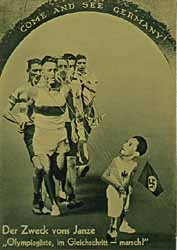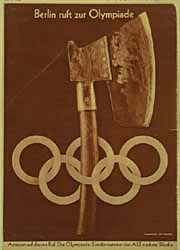|
|
|
|
There were short-lived boycott efforts in Great Britain, France, Sweden, Czechoslovakia, and the Netherlands. German Socialists and Communists in exile voiced their opposition to the Games through publications such as Arbeiter Illustrierte Zeitung (The Worker Illustrated Newspaper). Some boycott proponents supported counter-Olympics. One of the largest was the "People's Olympiad" planned for summer 1936 in Barcelona, Spain. It was canceled after the outbreak of the Spanish Civil War in July 1936, just as thousands of athletes had begun to arrive.
Individual Jewish athletes from a number of European countries also chose to boycott the Berlin Olympics. But once the Amateur Athletic Union of the United States voted for participation in December 1935, the other countries fell in line. Forty-nine teams from around the world competed in the Berlin Games, more than in any previous Olympics.
Heartfield (1891-1968)
These satirical photomontage images were drawn by the German artist John Heartfield (1891-1968) for the July 1936 issue of Arbeiter Illustrierte Zeitung (The Worker Illustrated Newspaper), published by German Communists in exile.
|

 German Minister of Propaganda Goebbels leads the world's athletes to the Games. —USHMM #14927/The Heartfield Community of Heirs, (c) 1996 Artists Rights Society, VG Bild-Kunst, Bonn
|

German Minister of Propaganda Goebbels leads the world's athletes to the Games. —USHMM #14927/The Heartfield Community of Heirs, (c) 1996 Artists Rights Society, VG Bild-Kunst, Bonn
|

 “Berlin Summons to the Olympiad.” —USHMM #14925/The Heartfield Community of Heirs, (c) 1996 Artists Rights Society, VG Bild-Kunst, Bonn
|

“Berlin Summons to the Olympiad.” —USHMM #14925/The Heartfield Community of Heirs, (c) 1996 Artists Rights Society, VG Bild-Kunst, Bonn
|
|
The Museum’s exhibitions are supported by the Lester Robbins and Sheila Johnson Robbins Traveling and Special Exhibitions Fund, established in 1990.
|
